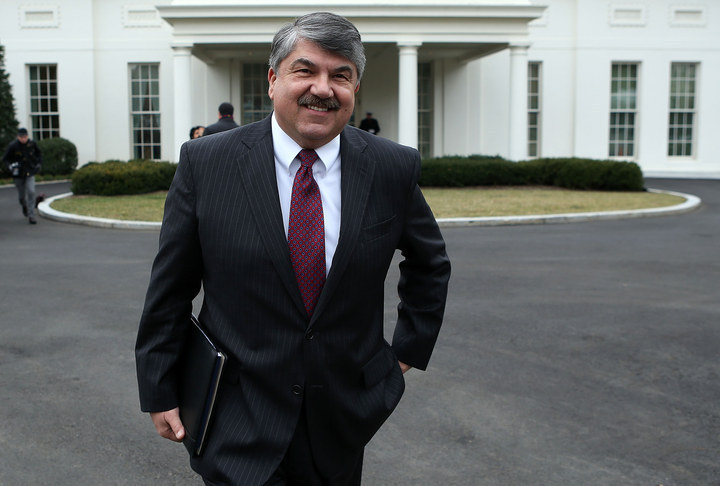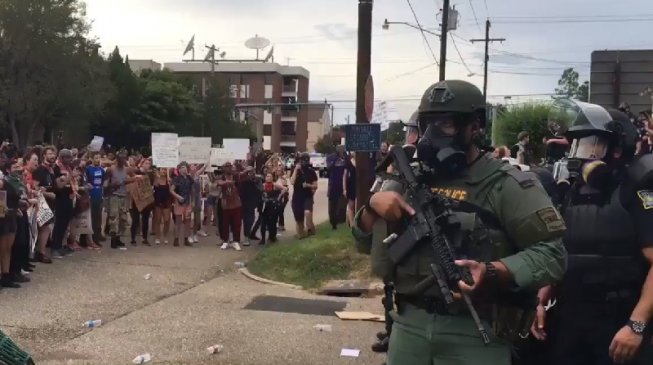Image from Izquierda Diario
On July 6, Philando Castile was shot dead by St. Anthony Police Officer Jeronimo Yanez. Footage taken by Castile’s girlfriend went viral. Still reeling from the murder of Alton Sterling by police the day before, thousands took the streets to protest in rage .
Castile was a 32-year-old cafeteria worker and member of Teamsters Local 320. Undoubtedly compelled to respond, AFL-CIO President Richard Trumka issued a statement saying, “Labor cannot and will not sit on the sidelines when it comes to racial justice.” He further pointed out the federation’s “Commission on Racial and Economic Justice,” formed in 2012 “to take a hard look at ourselves to ensure we practice what we preach.”
Teamsters Local 320 and Minnesota AFL-CIO have also released [statements->
http://www.workdayminnesota.org/articles/afl-cio-teamsters-mourn-shooting-death-philando-castile], remembering Castile and his 14+years in the union. Local 320 President Sami Gabriel said, “I have known Philando ‘Phil’ Castile since he joined the Teamsters back in 2002 and he was an amazing person.” The same local and the larger Teamsters Law Enforcement League represents thousands of Boys in Blue of all shades and stripes: housing police, school police, court deputies and marshals, county jail cops, and special officers.
On July 7, shootings occurred in Dallas. Authorities at first wrongfully pinned Mark Hughes as a suspect. During interrogations with police, he was accused of being caught on camera–a complete fabrication. Soon after, police detonated a robot bomb, killing Micah Johnson–the man held responsible for the shootings. There were no trials for Johnson, who was the 136th Black person to be killed by police since January.
After the incident in Dallas, Richard Trumka addresses the public again , but this time to “mourn the loss of the officers who were shot in the line of duty in Dallas, protecting the right to protest peacefully.” This, when police forces are being heavily deployed in cities across the country to intimidate, gas, beat, and arrest protesters. On Saturday night, over 200 protesters were arrested in Baton Rouge and St. Paul.

Photo: AFL-CIO President Richard Trumka. Buzzfeed
Obama said, “Our police have an extremely difficult job and the vast majority are doing their job in an outstanding fashion.” There have been 571 people killed by police since January, Texas being the state with second-highest number.
Police officials, politicians, and the mainstream media are calling for the public to rally behind the police. They want to direct public sentiment towards this unusual event, rather than the everyday occurence of racist police brutality.
the AFL-CIO has fallen in line behind a vastly conciliatory message, diminishing the loss of working-class Black Lives.
Dallas Mayor Michael Rawlings called the Dallas police among the “best…in the nation,” claiming, “We’ve done things with civil rights. Our police officers are the line that keeps us safe…We need to honor all the police in America.” In 2013, officers of the same police department shot Bobby Bennett , a 52-year-old man with bipolar disorder and schizophrenia, as he stood yards away with his arms at his sides. Disgusted with the grand jury’s indictment of the perpetrating officer, Police Association President Ron Pinkston said, “The Dallas Police Department has the most restrictive deadly force policy in the nation.” Despite the use of “restrictive force” the Dallas PD is responsible for the murders of many others, like Bertrand Davis, shot and killed by Dallas police and Andrew Gaynier, 26, shot and killed by an off-duty Dallas cop.
Today, thousands throughout the country are protesting, shutting down highways and marching to demand justice for Alton Sterling and Philando Castile. But the AFL-CIO has fallen in line behind a vastly conciliatory message, diminishing the loss of working-class Black Lives. Many unions have remained noticeably silent, making no calls to action and no public statements.
In Trumka’s words, “It is not enough to simply say ‘Black Lives Matter.’” But what steps are being taken by the leaders of the AFL-CIO, the largest workers’ organization in the US, to “address issues of racial and economic inequality”? What are the Teamster union officials doing today to fight for justice for union brother Philando Castile?
Video of Julia Wallace at a protest on Saturday, July 9, making a case for “Cops Out”
Last year, members of UAW Local 2865 in California passed a resolution calling on the AFL-CIO to disaffiliate the International Union of Police Associations (IUPA), chartered with the AFL-CIO since 1979. Trumka and AFL-CIO leaders have refused, stating they will not end the federation’s affiliation with the IUPA. AFL-CIO Civil, Human & Women’s Rights Director Carmen Berkeley said ,“We are not in the business of kicking people out of unions…What we are in the business of is having conversations with our law enforcement brothers and sisters…[T]here’s a lot of reconciliation that needs to happen between communities of color and law enforcement, and we want to be the bridge that helps them get there.”
Cop in a Union–Still a Cop
While labor unions in general play a formally reform-driven function, police unions and organizations of armed forces of the state carry a special function. If the role of the police is the everyday surveillance of the working class and oppressed to ensure conditions of capitalist accumulation, private property and the ruling order, then the role of the police union is to protect them as they carry out this assignment.
Police chiefs and union presidents have univocally defended the moral position and legal innocence of their rank-and-file murderers.
When cops get caught in the “excesses” of their duties–like shooting an unarmed Black man in his car for no reason–the cop union will defend one of theirs in court to absolve them of murder. Through union negotiated contracts, cops who kill on the job are summarily protected and even lavished with paid suspension and leave.
Police chiefs and union presidents have univocally defended the moral position and legal innocence of their rank-and-file murderers. Jeronimo Yanez is a member of the Law Enforcement Labor Services police union. Already, the police union came out with a statement emphasizing “officers’ right to due process” .
Not only do local police departments and cop unions invariably protect their own, but police nationwide can be seen closing ranks, claiming “Blue Lives Matter” and defending any cop against the consequences of their brutal actions. After five cops were killed in the shooting in Dallas, the Seattle Police Officers Guild spoke out against the whole Black Lives Matter movement, [posting on the union’s Facebook page ->
http://www.seattletimes.com/seattle-news/seattle-police-union-deletes-minority-movement-facebook-post-about-dallas-shooting/], “The hatred of law enforcement by a minority movement is disgusting…Heads in swivels brothers and sisters…#Weshallovercome.”
And less than a month ago in Baltimore, Fraternal Order of Police Lodge #3 President Gene Ryan welcomed the acquittal of a cop involved in the murder of Freddie Gray. Ryan stated , “We are very pleased and extremely grateful that Judge Williams has found Officer Caesar Goodson not guilty of all charges.” He went on to call on State Prosecutor Mosby to “reconsider her malicious prosecution,” adding, “FOP Lodge 3 is fully prepared to continue to represent the four remaining officers in this case for as long as is necessary.”
Unions and the Crisis of Leadership
With few exceptions, labor unions operate as buffers between workers and bosses. One of their primary defining functions is to negotiate the terms of exploitation of workers. Darlington and Upchurch describe unions as the “mediator between capital and labour” and point to the particular social role of the union bureaucracy–the executive layer of labor unions–which leads to “the establishment of accommodative relationships with employers and the state.” There is a dichotomy between the rank-and-file and the union bureaucracy, felt by workers everywhere.
The divide between union leadership and the rank-and-file tends to widen as the labor movement becomes more militant: “While for workers a mass strike driven from below…can raise the prospect of the transformation of society, for the official it can seem to represent a threat to their raison d’être” (Darlington and Upchurch).
The divide between union leadership and the rank-and-file tends to widen as the labor movement becomes more militant.
Union officialdom, securing itself substantial material benefits, constantly “balances between the employers/state on the one hand, and the workers on the other. It holds back and controls workers’ struggle, but it has a vital interest not to push the collaboration with employers and the state to a point where it makes the unions completely impotent” (Cliff and Gluckstein). These characteristics of the labor bureaucracy and union leaders are exemplified by their repeated alignment with the capitalist Democratic Party.
That said, there are 14.8 million unionized workers in the US, or 11.1 percent of all workers. A significant sector of public employees–35 percent–are unionized (Bureau of Labor & Statistics 2015). Unions are working-class organizations with the potential to advance workers’ demands. They have intrinsic limits stemming from their very function–and roots–within capitalism, but in spite of this contradiction, rank-and-file workers can fight for more radical demands.
Examples of rank-and-file unionism in Argentina and other countries have demonstrated workers’ potential to respond to crisis, factory shutdowns, and attacks through independent committees and left caucuses and go beyond corporatist or short-term economic interests. Such committees have shown the ability to oppose the bureaucracy and lay out an alternative, independent path for class struggle. The fight for equal pay and gender equality, elimination of subcontracting and tiered wage-and-benefit systems, and defense of jobs against layoffs are some of the conquests of these small yet dynamic formations.
Examples of rank-and-file unionism in Argentina and other countries have demonstrated workers’ potential to respond to crisis, factory shutdowns and attacks
By flexing its muscles in these ways, the working class builds its confidence as the transformative and revolutionary class and develops political independence from capitalists and their helpers.
What Can Workers Do to Fight Against Police Brutality
Workers and the left gain nothing by being uncritically “pro-union”; especially if it means supporting practices that are complicit with racism and the murder of working class people.
As workers, we can act through unions to build the movement against police brutality by forcing our demands on union leaders. The members of Castile’s Local 320 can fight for justice by refusing to share their union with the police. They can call on their regional and international AFL-CIO to disaffiliate the IUPA and other cop organizations. Advancing the example of UAW Local 2865, union members throughout the US can push officials to kick out all cop organizations from our unions.
We can call on our union delegates, stewards, and leaders to take up the fight against police brutality that is raging in the streets. We can talk to coworkers and organize with them to demand our unions create a program against police brutality and racial oppression.
For a Strike Against Police Brutality
There is an expanding awareness of police brutality and systemic racism that has weakened the grip of the post-racial myth. We are also seeing a coming together of sectors of Black youth and the working class. Some activists and workers have begun to call for working-class unity against police brutality–for workers and unions everywhere to disrupt the order of business and shut down production. While we are still a long way from the realization of multi-trade mass industrial action, in social media, some have circulated the idea of “calling out Black” (vs. calling out sick) to protest racist policing; hashtag campaigns for political strikes are gaining traction. Pockets of rank-and-file union members are asking their shop stewards and union leaders to put Black Lives Matter on the agenda. At union meetings, they are bringing up the recent murders of Castile and Sterling, asking what the unions can do.
The working-class fightback against racism is a central element in the path toward building a revolutionary movement.
If deepened and expanded across the country, actions like these by the rank-and-file can build the basis for a working-class united front, with the power to mobilize thousands or millions of workers to oppose racism. This would signal an important shift for labor as well as the movement against racism and police.
The working-class fightback against racism is a central element in the path toward building a revolutionary movement. The numerous police murders of Black people show us that race is a determining factor in the lives of Blacks and people of color in the US. It is also a central force within capitalism.
For the left and working class, the “race problem” cannot be put aside until later. Any radical transformation ties class struggle with the fight against racism, which includes upholding the right to self-organization and self-determination. Class struggle, together with Black struggle. Perhaps the two processes develop separately, in abrupt leaps and jerking movements, in distinct spaces, and among different people–but both defend the people against capitalism’s assaults and work to undermine the class system in the long run.
*Total number of people killed by the police in the US this year, through July 10, 2016.
References
Cliff, T. and Gluckstein, D. (1986) Marxism and Trade Union Struggle: The General Strike of 1926, London: Bookmarks. Pp. 27-8.
Darlington, R. and Upchurch, M. (2012) A reappraisal of the rank-and-file versus bureaucracy debate. Capital & Class, 36 (1). Pp. 77-95. ISSN 0309-8168











